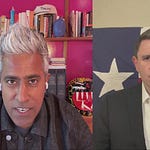The day after the election, Anand joined Ezra Levin, the co-founder of Indivisible, for a conversation with KALW Public Media’s “Your Call” on the way forward for people looking to challenge — or even just to carry on in — the Trump II era.
Anand and Ezra talked with host Ethan Elkind (and fielded questions from KALW listeners), covering everything from how to identify practical goals and focus political energy to achieve them over the next four years, to how to manage the information overload of Trumpism, to analyzing what’s wrong with the Democratic Party and what needs to change to build an opposition that reflects the power of the people. Click on the player above to listen to the conversation, or scroll down to read excerpts in the transcript below.
Let me start with a question for you both just to get a temperature check. It's been now about 24 hours since the presidency changed hands. And I wanted to find out how you both are doing and what sort of jumped out to you now about this moment 24 hours in.
Ezra, I'll start with you for that one.
Ezra Levin: Well, a lot of what we've seen over the last 24 hours is what we predicted Trump would do. He is moving forward with a deeply unpopular agenda that he did his best to distance himself from throughout all of last year.
He swore up and down that he had nothing to do with Project 2025, and that he was going to go in a different direction, and lo and behold, that wasn't the case.
Immediately upon taking office, he takes some of the most egregious actions that were thought up in that terrifying plan, and he's putting them into the world now. He is using the power of the presidency to pursue that agenda.
I think the real question for all of us now is, how does America respond? How do people respond? But he is doing exactly what we thought he would do.
Yeah. And Anand, what about you? What jumps out at you now 24 hours in, and how are you feeling about what's happening?
Anand Giridharadas: Well, yesterday was the inauguration, and I woke up today, and it was 10 degrees in New York, 22 below freezing, so thanks, Trump.
It does feel like a chill has come to this country. And I know a lot of people who didn't watch yesterday, and I can understand that the brain is an important organ to maintain the health and wellness of. But I did watch, even got, you know, my nine-year-old son to watch, even though he wanted to keep going to play. And I said it was important to watch this, to understand the context of what's going to unfold.
Listen to this episode with a 7-day free trial
Subscribe to The.Ink to listen to this post and get 7 days of free access to the full post archives.














